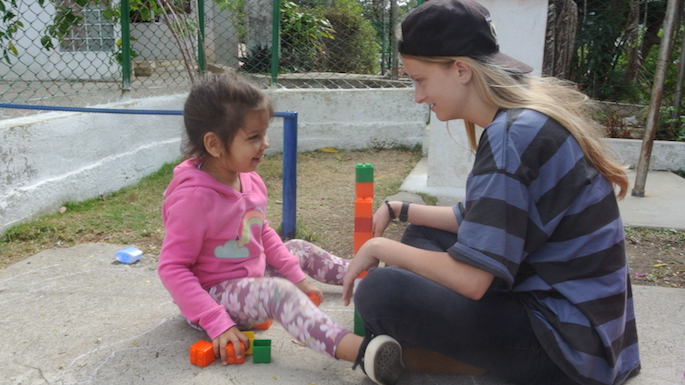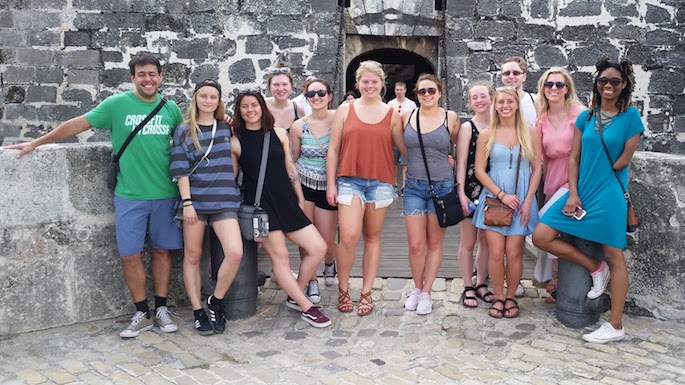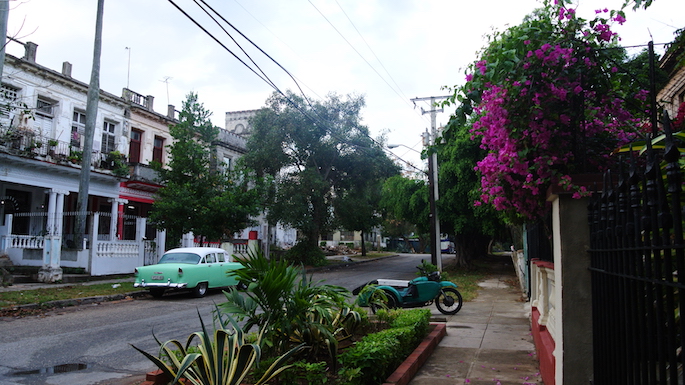Posted 11:26 a.m. Tuesday, May 1, 2018

Students explore healthcare, education in socialist society.
Students explore healthcare, education in socialist society
UWL student Demi Weisbrod grew up hearing negative things about Cuba — and its government. When her parents learned she was traveling to the communist-led country over spring break, they were initially concerned. But the story of Cuba isn’t so black and white — good or bad. On the island, Weisbrod met “the most beautiful people I’ve met in a long time.” She also learned about the country’s education and healthcare systems, both different from the U.S., but yielding some impressive results. Cubans on average live to the age of about 79 — the same age as in the U.S., according to the World Health Organization. And the infant mortality rate matches some of the world’s richest countries, with six deaths for every 1,000 births, according to data from the World Bank. Despite having strong social systems in place for its people, Cuba has a difficult economic and political history — including the U.S. economic embargo since 1960. While Cuba is more commercialized today and part of the global economy, the country is frequently referred to as “frozen in time.” Technological advances have been slow coming — even internet access is very limited. For all of these contradictions and its historical relationship with the U.S., Cuba provides a fascinating context for study, says Omar Granados, associate professor of Global Cultures and Languages. That was the impetus for the first UWL student trip to Cuba over spring break, March 9-19. Ten students — primarily Spanish majors and minors and half studying public health — learned about the country’s historic relationship with the U.S., its education and healthcare systems. UWL’s Office of International Education and Engagement helped organize the trip. Weisbrod, a senior public health and Spanish major, received an undergraduate research grant to study the The LGBTQ+ experience in Cuba. Her visit was part of a semester-long research project that used an interdisciplinary lens — Spanish, Latin American studies, Public Health and Community Health education — to examine the social and political climate surrounding the LGBTQ+ community in contemporary Cuba. She also wanted to understand Cuba’s low HIV and STD rates and prevention efforts, after finding a dearth of information in literature here. [caption id="attachment_52008" align="alignnone" width="685"] UWL student Demi Weisbrod talking to a girl at school in Las Terrazas, an organic community village the group visited.[/caption]
Megan Strom, assistant professor of Global Cultures and Languages, sees the trip as a tremendous opportunity to serve students in health professions. Many students in these majors find it hard to fit study abroad into their schedules. But Cuba can offer an amazing opportunity to compare and contrast healthcare systems and a shorter trip makes it more accessible to more students, she says. It also helps prepare them for a future working with diverse populations.
The goal is to expand the trip into a winter intersession experience for community health majors in the future and potentially create a continuing education experience as well.
[caption id="attachment_52010" align="alignnone" width="685"]
UWL student Demi Weisbrod talking to a girl at school in Las Terrazas, an organic community village the group visited.[/caption]
Megan Strom, assistant professor of Global Cultures and Languages, sees the trip as a tremendous opportunity to serve students in health professions. Many students in these majors find it hard to fit study abroad into their schedules. But Cuba can offer an amazing opportunity to compare and contrast healthcare systems and a shorter trip makes it more accessible to more students, she says. It also helps prepare them for a future working with diverse populations.
The goal is to expand the trip into a winter intersession experience for community health majors in the future and potentially create a continuing education experience as well.
[caption id="attachment_52010" align="alignnone" width="685"] Students on the trip were primarily Spanish majors and minors. Some were in the Spanish course, Current Events. Others conducted independent studies focused on specific aspects of Cuban society. Here faculty and students are at Castillo de la Real Fuerza, Habana Vieja. From left, Omar Granados, Demi Weisbrod, Rachel Steffen, Laura Fischer, Morgan Kuptz, Sydney Watts, Carissa Shlafer, Zoey Good, Lauren Olsen, Joshua Jensen, Megan Strom and Kimmesha Thomas.[/caption]
Junior Laura Fischer, public health major and Spanish minor, says study abroad — up until this point — was not possible because she worried about not graduating on time. “After having this experience, I realize it was worth setting aside the time to do it,” she admits.
She saw Cuba’s great strides on disease prevention, even without some of the fancy machines and technology available in the U.S. It showed her the ways the U.S. could be falling short.
[caption id="attachment_52013" align="alignnone" width="685"]
Students on the trip were primarily Spanish majors and minors. Some were in the Spanish course, Current Events. Others conducted independent studies focused on specific aspects of Cuban society. Here faculty and students are at Castillo de la Real Fuerza, Habana Vieja. From left, Omar Granados, Demi Weisbrod, Rachel Steffen, Laura Fischer, Morgan Kuptz, Sydney Watts, Carissa Shlafer, Zoey Good, Lauren Olsen, Joshua Jensen, Megan Strom and Kimmesha Thomas.[/caption]
Junior Laura Fischer, public health major and Spanish minor, says study abroad — up until this point — was not possible because she worried about not graduating on time. “After having this experience, I realize it was worth setting aside the time to do it,” she admits.
She saw Cuba’s great strides on disease prevention, even without some of the fancy machines and technology available in the U.S. It showed her the ways the U.S. could be falling short.
[caption id="attachment_52013" align="alignnone" width="685"] A street in a neighborhood where students stayed called El Vedado. Cuba the is frequently referred to as “frozen in time.”[/caption]
It was a “happy coincidence,” says Granados, that the trip also fell just months before the installation of Cuba’s new president, Miguel Díaz-Canel, the first non-Castro to lead the country in 60 years.
“This was truly historic moment in Cuban history. … Students were able to witness this moment — the culture, the society and the politics of it all,” Granados notes.
Another unintended experience for students was living — even for a short time — without internet access. But Fischer says that lack of texting and posting was actually a refreshing change.
“Being away from that was eye opening. I’ve made great friends with the nine other students because we were forced to talk to each other and interact,” she explains. “When we came back, I felt I was closer to these people than to people I had known for years.”
A street in a neighborhood where students stayed called El Vedado. Cuba the is frequently referred to as “frozen in time.”[/caption]
It was a “happy coincidence,” says Granados, that the trip also fell just months before the installation of Cuba’s new president, Miguel Díaz-Canel, the first non-Castro to lead the country in 60 years.
“This was truly historic moment in Cuban history. … Students were able to witness this moment — the culture, the society and the politics of it all,” Granados notes.
Another unintended experience for students was living — even for a short time — without internet access. But Fischer says that lack of texting and posting was actually a refreshing change.
“Being away from that was eye opening. I’ve made great friends with the nine other students because we were forced to talk to each other and interact,” she explains. “When we came back, I felt I was closer to these people than to people I had known for years.”